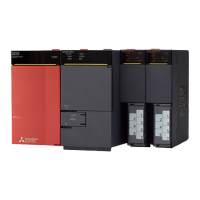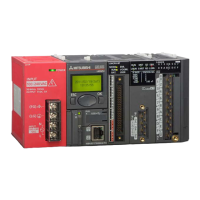172
6 BASIC INSTRUCTIONS
6.2 Arithmetic Operation Instructions
■When DADD instruction is used
When specifying word devices, a device for the lower-order 16-bits is specified first, and then a word device with the next
device number is set for the higher-order 16 bits. To prevent number overlap, it is recommended to always specify an even
number.
■When specifying the same device in the source and destination
The same device number can be specified for both the source and the destination. In this case, note that the addition result
changes in every operation cycle if a continuous operation type ADD instruction is used.
■Difference between DADD(P) instruction, D+(P) instruction, and DINC(P) instruction in a
program for adding "+1"
When DADD(P) instruction is used to add 1 to the contents of D0 every time X1 turns from OFF to ON, DADD(P) instruction is
similar to D+(P) instruction and DINC(P) instruction described later except for the contents shown in the table below.
There is no operation error.
DADD(P) instruction D+(P) instruction, DINC(P) instruction
Flag (zero, borrow or carry) Operates Does not operate
Operation
result
(s)+1=(d) +2147483647 0 +1 +2 … +2147483647 -2147483648 -2147483647 …
DADD
D0 K25 D0
X1
(D0)+25 → (D0)

